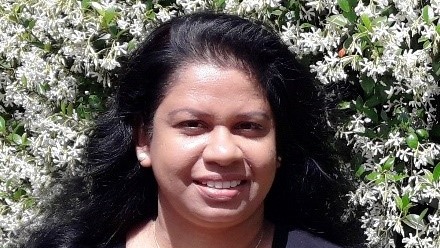A number of our Intelligent Polymer Research Institute (IPRI) students have wrapped up their PhD studies and have either recently submitted their thesis or are set to graduate before moving on to their next career adventure. We caught up with a handful of them for our PhD Interview series to find out more about their work, how the post-graduate experience was for them, what’s next and more.
First up, we spoke with Sujani Abeywardena, who worked on the development of a textile-based electrofluidic platform for analysing cellular metabolites. During her PhD, she was able to get her research published as well as compete in the Three Minute Thesis (3MT) competition and more. We had a chat with Sujani about all of this and more, including where she is now post-PhD.
Congratulations on your graduation! Can you tell us a bit about your PhD research topic and how it all went?
Thank you! My PhD was one of the ARC Centre of Excellence for Electromaterials Science (ACES) projects under the theme of Electrofluidics and Diagnostics. I focused on developing a textile-based electrofluidic platform for analysing cellular metabolites. Electrofluidics, which is driven by electric fields, offers a powerful tool for separating and detecting cell-secreted metabolites. By using textiles, a low-cost material with unique properties, I fabricated and investigated various braided textile structures.
Different types of cells were incorporated into the textile structure through a photocrosslinkable hydrogel. The study highlighted the challenge of combining the contrasting conditions needed for cell culture and electrophoresis into one platform, allowing for metabolite analysis without disrupting the cell culture system.
Why did you decide to do a PhD and why specifically at IPRI?
I decided to pursue a PhD because of my deep passion for research and my strong desire to become a researcher or scientist after completing my master’s. I thought that obtaining a PhD would be the best way to achieve this goal to provide the opportunity to develop expertise in research through hands-on experience and gain essential skills.
Additionally, my prior research background in textiles aligned perfectly with the focus of this research, making IPRI an ideal place for me to further my knowledge and contribute to innovative work in the field.
What were the biggest things you learned throughout the process?
During my PhD, I learned many important lessons that helped me grow as a researcher. Perseverance and problem-solving were key, as I faced unexpected challenges and had to think creatively to solve problems step by step. I also learned how important collaboration and communication are - working with others and sharing ideas made the research better. Being able to explain complex ideas clearly to different audiences was very valuable, such as for the 3MT Competition. These experiences not only improved my technical skills but also made me a better team player and a more determined researcher.
What’s next for you?
I had a great opportunity to work as a postdoctoral researcher at the University of Sydney and I will continue to work there as a researcher in the biomedical field.
What was the biggest challenge you had to overcome during your PhD?
The biggest challenge I faced during my PhD was dealing with unexpected research setbacks and failed experiments. There were moments when my data did not turn out as expected, which was discouraging. However, I had to learn how to stay persistent, adapt my approach, and find creative solutions to keep moving forward. Balancing the emotional and mental strain during these times was tough, but overcoming this taught me resilience and made me a stronger researcher.
What would be your favourite moment throughout it all?
My favourite moments were the successful milestones during my PhD journey. One standout was when my research articles were published, and even more exciting was when one of my publications was selected as the best student paper by the journal. I also felt an overwhelming sense of pride and accomplishment when I received my official PhD completion letter. I am really grateful to my supervisors Professor Peter Innis and Professor Zhilian You, and Distinguished Professor Gordon Wallace for their unwavering support and guidance.
Can you offer any advice to current PhD students who have just started their journey?
My advice to current PhD students is to enjoy the journey; it will have many ups and downs, but maintaining a "never give up" attitude is essential. Collaborate as much as you can and focus on building both technical and soft skills; this will greatly enhance your research and future opportunities. Publish your research data whenever possible, and do not be disheartened by failed experiments or discouraging results. These setbacks are part of the process and often lead to new discoveries that can make a significant impact in your field. Stay determined, and remember that persistence is key.
Thanks, Sujani - and congratulations once more.
Sujani will graduate at next week’s University of Wollongong ceremony on October 29. If you are interested in doing a PhD at IPRI, be sure to get in touch with us to chat more about the possibilities at the Institute.
